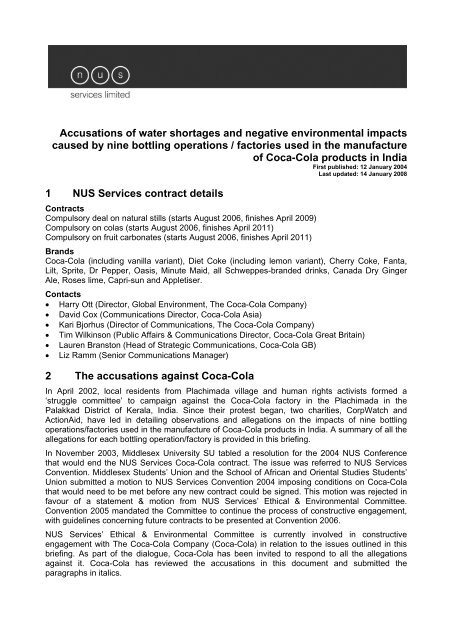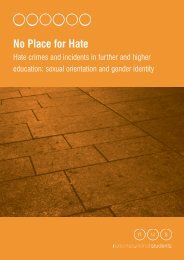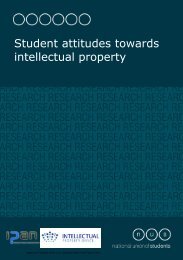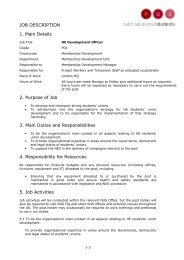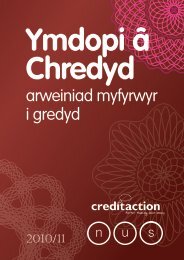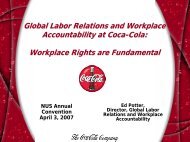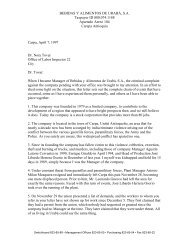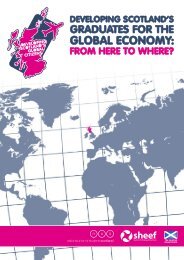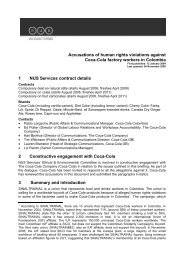Download the India Briefing - National Union of Students
Download the India Briefing - National Union of Students
Download the India Briefing - National Union of Students
Create successful ePaper yourself
Turn your PDF publications into a flip-book with our unique Google optimized e-Paper software.
Accusations <strong>of</strong> water shortages and negative environmental impacts<br />
caused by nine bottling operations / factories used in <strong>the</strong> manufacture<br />
<strong>of</strong> Coca-Cola products in <strong>India</strong><br />
First published: 12 January 2004<br />
Last updated: 14 January 2008<br />
1 NUS Services contract details<br />
Contracts<br />
Compulsory deal on natural stills (starts August 2006, finishes April 2009)<br />
Compulsory on colas (starts August 2006, finishes April 2011)<br />
Compulsory on fruit carbonates (starts August 2006, finishes April 2011)<br />
Brands<br />
Coca-Cola (including vanilla variant), Diet Coke (including lemon variant), Cherry Coke, Fanta,<br />
Lilt, Sprite, Dr Pepper, Oasis, Minute Maid, all Schweppes-branded drinks, Canada Dry Ginger<br />
Ale, Roses lime, Capri-sun and Appletiser.<br />
Contacts<br />
• Harry Ott (Director, Global Environment, The Coca-Cola Company)<br />
• David Cox (Communications Director, Coca-Cola Asia)<br />
• Kari Bjorhus (Director <strong>of</strong> Communications, The Coca-Cola Company)<br />
• Tim Wilkinson (Public Affairs & Communications Director, Coca-Cola Great Britain)<br />
• Lauren Branston (Head <strong>of</strong> Strategic Communications, Coca-Cola GB)<br />
• Liz Ramm (Senior Communications Manager)<br />
2 The accusations against Coca-Cola<br />
In April 2002, local residents from Plachimada village and human rights activists formed a<br />
‘struggle committee’ to campaign against <strong>the</strong> Coca-Cola factory in <strong>the</strong> Plachimada in <strong>the</strong><br />
Palakkad District <strong>of</strong> Kerala, <strong>India</strong>. Since <strong>the</strong>ir protest began, two charities, CorpWatch and<br />
ActionAid, have led in detailing observations and allegations on <strong>the</strong> impacts <strong>of</strong> nine bottling<br />
operations/factories used in <strong>the</strong> manufacture <strong>of</strong> Coca-Cola products in <strong>India</strong>. A summary <strong>of</strong> all <strong>the</strong><br />
allegations for each bottling operation/factory is provided in this briefing.<br />
In November 2003, Middlesex University SU tabled a resolution for <strong>the</strong> 2004 NUS Conference<br />
that would end <strong>the</strong> NUS Services Coca-Cola contract. The issue was referred to NUS Services<br />
Convention. Middlesex <strong>Students</strong>’ <strong>Union</strong> and <strong>the</strong> School <strong>of</strong> African and Oriental Studies <strong>Students</strong>’<br />
<strong>Union</strong> submitted a motion to NUS Services Convention 2004 imposing conditions on Coca-Cola<br />
that would need to be met before any new contract could be signed. This motion was rejected in<br />
favour <strong>of</strong> a statement & motion from NUS Services’ Ethical & Environmental Committee.<br />
Convention 2005 mandated <strong>the</strong> Committee to continue <strong>the</strong> process <strong>of</strong> constructive engagement,<br />
with guidelines concerning future contracts to be presented at Convention 2006.<br />
NUS Services’ Ethical & Environmental Committee is currently involved in constructive<br />
engagement with The Coca-Cola Company (Coca-Cola) in relation to <strong>the</strong> issues outlined in this<br />
briefing. As part <strong>of</strong> <strong>the</strong> dialogue, Coca-Cola has been invited to respond to all <strong>the</strong> allegations<br />
against it. Coca-Cola has reviewed <strong>the</strong> accusations in this document and submitted <strong>the</strong><br />
paragraphs in italics.
2.1 Coca-Cola bottler in Plachimada, Palakkad District, Kerala<br />
2.1.1 Introduction<br />
In 1999, <strong>the</strong> Hindustan Coca-Cola Beverages Pvt. Ltd (HCBL) established a factory in <strong>India</strong> at<br />
Plachimada on approximately 40-acres <strong>of</strong> multi-cropped paddy lands 1 . Six bore wells were sunk<br />
in <strong>the</strong> factory compound to extract water from a large aquifer at a depth <strong>of</strong> 40-80 metres, although<br />
it is understood that no more than three <strong>of</strong> <strong>the</strong>se six bore wells are used at any one time. Two<br />
open shallow wells were also dug to extract water from shallow ground water. In 2003, <strong>the</strong> factory<br />
manufactured Coca-Cola, Thums Up, Limca, Fanta, Sprite, Maaza for around 32,000 outlets. It<br />
employed 150 permanent staff and 250 contract labourers. It should be noted that Plachimada<br />
village is in a monsoon area that is prone to drought.<br />
2.1.2 Well water shortage and quality<br />
According to CorpWatch, six-months after <strong>the</strong> factory was opened, villagers and farmers living<br />
around <strong>the</strong> bottling factory began noticing changes in <strong>the</strong> quantity and quality <strong>of</strong> well water. Water<br />
from a well in Plachimada (a village with nearly 100 families living along <strong>the</strong> eastern wall <strong>of</strong> <strong>the</strong><br />
factory) turned brackish, milky white in colour and tasted bitter. Many local people reported<br />
stomach-aches. Because <strong>of</strong> concerns over water quality, local <strong>of</strong>ficials tested <strong>the</strong> well waters.<br />
This confirmed <strong>the</strong> presence <strong>of</strong> high levels <strong>of</strong> dissolved salts. CorpWatch has since stated that it<br />
is likely that this was caused by Coca-Cola’s rapid extraction <strong>of</strong> water from <strong>the</strong> aquifer, making<br />
water flow through surrounding limestone or clay at an increased rate resulting in additional<br />
limestone or clay particles entering <strong>the</strong> water supply.<br />
“According to a University <strong>of</strong> Rajasthan study, <strong>the</strong> entire beverage industry in <strong>India</strong> (<strong>of</strong><br />
which Coca-Cola is part) is responsible for just 0.002% <strong>of</strong> <strong>the</strong> country’s total water use.<br />
Agriculture alone is responsible for 81% <strong>of</strong> water consumption in <strong>India</strong>. The Coca-Cola<br />
Company agrees that <strong>the</strong>re has been a decrease in both water quality and quantity in <strong>the</strong><br />
Kerala area since it located <strong>the</strong>re, but agrees with Government studies which have<br />
concluded that severe deficiencies in rainfall during that period are <strong>the</strong> main cause <strong>of</strong><br />
water depletion and subsequent decrease in quality. The Company asserts that <strong>the</strong><br />
amount <strong>of</strong> water it draws is not significant enough to be responsible for <strong>the</strong> large-scale<br />
impact on local water, which is also a problem throughout <strong>the</strong> entire State <strong>of</strong> Kerala 2 . In<br />
addition, <strong>the</strong> Company points out that <strong>the</strong> plant uses 17 horsepower pumps to extract<br />
groundwater. These are <strong>of</strong> a similar power capacity as those used by farmers and o<strong>the</strong>r<br />
industries in <strong>the</strong> area so it is erroneous to regard this as a ‘rapid extraction’. There are 200<br />
open shallow wells and 150 bore wells all using <strong>the</strong> same water resource (i.e. within 5kms<br />
<strong>of</strong> <strong>the</strong> plant) as <strong>the</strong> Coca-Cola plant. These are owned by farmers and <strong>the</strong> 27 o<strong>the</strong>r water<br />
based industries in <strong>the</strong> same area.”<br />
On 13 May 2003, <strong>the</strong> District Medical Officer <strong>of</strong> <strong>the</strong> Public Health Centre in <strong>the</strong> village announced<br />
that people should not drink water from <strong>the</strong> three wells next to <strong>the</strong> Coca-Cola factory because <strong>the</strong><br />
hardness, chlorides and concentration <strong>of</strong> total dissolved solids were beyond tolerable levels for<br />
drinking water, domestic use (bathing and washing) and irrigation 3 . A similar study by<br />
Environmental Law Alliance Worldwide found that water from two <strong>of</strong> <strong>the</strong> wells was ‘very hard’.<br />
“The Coca-Cola Company agrees with <strong>the</strong> assessment that water quality around its plant<br />
is poor, but says that this is <strong>the</strong> case throughout <strong>the</strong> State <strong>of</strong> Kerala and not just around its<br />
plant.”<br />
Crop yields also started to decline. There was a reported six-fold decrease in <strong>the</strong> local coconut<br />
yield 4 . A People's Commission report found that 250 hectares <strong>of</strong> wet paddy fields in <strong>the</strong><br />
1 Note that Hindustan Coca-Cola Beverages Pvt. Ltd and Bharat Coca-Cola Bottling are both 51% owned<br />
by The Coca-Cola Company.<br />
2 <strong>India</strong>’s Central Ground Water Board study on water stressed areas in Kerala, 2003<br />
3 www.indiaresource.org/campaigns/coke/2003/continuingbattle.html<br />
4 www.corpwatchindia.org<br />
DOWNLOADED FROM NUSSL.CO.UK PAGE 2
neighbourhood <strong>of</strong> <strong>the</strong> factory had also dried up. According to local estimates 5 , <strong>the</strong> water<br />
shortages had affected <strong>the</strong> land <strong>of</strong> more than 2,000 people residing within 1.2 miles <strong>of</strong> <strong>the</strong> factory.<br />
“The Coca-Cola Company agrees that local agriculture is suffering as a result <strong>of</strong> a<br />
dramatic decrease in rainfall. It has however received <strong>the</strong> written support <strong>of</strong> local farmers<br />
in <strong>the</strong> form <strong>of</strong> a letter from <strong>the</strong> <strong>National</strong> Farmers Protection Committee in which its<br />
President, Mr. Ravi Kumar, states, “None <strong>of</strong> <strong>the</strong> charges against <strong>the</strong> Company could<br />
withstand serious scrutiny”.”<br />
HCBL and Coca-Cola have consistently denied responsibility for <strong>the</strong> water shortages and water<br />
quality issues in surrounding wells. In an article in The Guardian (25 July 2003), <strong>the</strong> Vice-<br />
President <strong>of</strong> Coca-Cola-<strong>India</strong>, Sunil Gupta, states that it is lack <strong>of</strong> rainfall that has caused local<br />
water supplies to be exhausted, and that <strong>the</strong> Company has been <strong>the</strong> target <strong>of</strong> a handful <strong>of</strong><br />
extremist protesters. It claims to have <strong>the</strong> written support <strong>of</strong> local tribal leaders and says that <strong>the</strong><br />
vast majority <strong>of</strong> local people support <strong>the</strong> factory. Coca-Cola states that, unlike a mineral extraction<br />
business, and for commercial reasons, it does not locate a factory unless it is indefinitely<br />
sustainable, and that it <strong>the</strong>refore has no interest in simply using all <strong>the</strong> water resources.<br />
2.1.3 Contradictory evidence<br />
In 2002, <strong>the</strong> Kerala State Groundwater Department (KSGD) reported that only three wells showed<br />
quality problems and a drop in water levels 6 out <strong>of</strong> a total <strong>of</strong> twenty tested. They also found that<br />
<strong>the</strong>re had been a reduction in <strong>the</strong> average annual rainfall in <strong>the</strong> area - from 2137 mm in <strong>the</strong> year<br />
2000 to 1147 mm in 2001 and just 670 mm in 2002 – and that <strong>the</strong> depletion <strong>of</strong> water in <strong>the</strong> open<br />
wells was due to reduced rainfall and <strong>the</strong> high density <strong>of</strong> irrigation bore wells. In November 2002,<br />
<strong>the</strong> KSGD added, ‘any depletion in ground water was due to less than normal levels <strong>of</strong> rainfall<br />
and could not be attributed to <strong>the</strong> [Coca-Cola] plant’.<br />
CorpWatch responded to this report by stating that <strong>the</strong> findings were based on insufficient field<br />
data (only eight months' rainfall) collected from too small an area (one square kilometre).<br />
In February 2003, <strong>the</strong> national water regulator, The Central Groundwater Authority (CGA) tested<br />
33 wells around <strong>the</strong> Coca-Cola factory and concluded that <strong>the</strong> factory operations have not<br />
adversely affected that quality <strong>of</strong> groundwater. In September 2003, <strong>the</strong> CGA stated, ‘<strong>the</strong>re were<br />
no abnormal changes in ground water levels around <strong>the</strong> factory that can be attributed to its<br />
operations.’ A report commissioned by Coca-Cola in 2002 7 supports this and states <strong>the</strong>re is ‘no<br />
evidence <strong>of</strong> overexploitation <strong>of</strong> <strong>the</strong> groundwater reserves in <strong>the</strong> factory area’.<br />
Conversely, in March 2004, The Department <strong>of</strong> Ground Water found that <strong>the</strong> changes in well<br />
water quantity surrounding <strong>the</strong> Plachimada factory were due to excess drawing <strong>of</strong> water by <strong>the</strong><br />
Company and less rainfall. This was based on evidence collected from 18 wells between March<br />
2002 and March 2003.<br />
2.1.4 Water extraction – <strong>the</strong> figures<br />
All <strong>the</strong> water used in <strong>the</strong> factory comes from ei<strong>the</strong>r shallow water supplies (60%) or <strong>the</strong><br />
underground aquifer (40%).<br />
• The Kerala Government told Coca-Cola that it is safe to draw up to 880,000 litres <strong>of</strong><br />
groundwater per day.<br />
• The Government <strong>of</strong> <strong>India</strong> provided HCBL with a licence to extract up to 560,000 litres <strong>of</strong><br />
groundwater per day.<br />
• According to HCBL, <strong>the</strong> factory’s maximum extraction capacity is 450,000 litres per day.<br />
Conversely, <strong>the</strong> Kerala State Pollution Control Board (KSPCB) has estimated that <strong>the</strong> factory<br />
could extract 1,500,000 litres <strong>of</strong> water a day at full capacity. Similarly, a People’s Commission<br />
team that entered <strong>the</strong> factory in 2002 has claimed that <strong>the</strong> factory can extract 1,000,000 litres<br />
in ten hours. HCBL claims that it usually averages 400,000 litres per day 8 . In <strong>the</strong> 16 December<br />
5 www.corpwatchindia.org<br />
6 www.indiaresource.org/campaigns/coke/2003/continuingbattle.html<br />
7 Report by an Emeritus scientist from <strong>the</strong> <strong>National</strong> Geophysical Research Institute.<br />
8 In 2002, <strong>the</strong> factory extracted an average <strong>of</strong> 386,342 litres per day, every day <strong>of</strong> <strong>the</strong> year.<br />
DOWNLOADED FROM NUSSL.CO.UK PAGE 3
Court ruling, an expert is cited as quoting <strong>the</strong> average daily water consumption at 510,000<br />
litres.<br />
• In January 2004, Coca-Cola claimed that, due to <strong>the</strong> rainwater harvesting and new<br />
efficiencies, it recharged <strong>the</strong> aquifers with <strong>the</strong> equivalent <strong>of</strong> all <strong>the</strong> water it used.<br />
“The aquifer is recharged naturally each year by monsoon rains, but to help accelerate this<br />
recharge, HCBL voluntarily installed <strong>the</strong> State’s largest rainwater harvesting facility in <strong>the</strong><br />
plant. In 2002, HCBL recharged over 50% <strong>of</strong> <strong>the</strong> amount <strong>of</strong> water extracted from <strong>the</strong><br />
aquifer amount through its rainwater harvesting technology. HCBL have recently acquired<br />
an additional 30 acres <strong>of</strong> land that <strong>the</strong>y hope to put to use for additional rainwater<br />
harvesting. It should be noted that <strong>the</strong> Coca-Cola plant has also provided this technology<br />
free <strong>of</strong> charge to five local farms and a school. It is <strong>the</strong> only industry <strong>of</strong> <strong>the</strong> 27 water-based<br />
industries in <strong>the</strong> area to have adopted rainwater harvesting on this scale and to have<br />
freely shared it with <strong>the</strong> community.”<br />
Coca-Cola claims that, when <strong>the</strong> new 30 acres <strong>of</strong> rainwater harvesting are completed, it will<br />
recharge more than it uses. It should be noted that CorpWatch states that no effort has been<br />
made to independently verify ei<strong>the</strong>r <strong>the</strong> quantity <strong>of</strong> water extracted by <strong>the</strong> factory, or <strong>the</strong> amount<br />
<strong>of</strong> water <strong>the</strong> Company to gains through rainwater harvesting.<br />
“The Coca-Cola Company, <strong>the</strong> Kerala State Groundwater Department and <strong>the</strong> Central<br />
Groundwater Authority have denied this, as all water usage on <strong>the</strong> site is metered and<br />
recorded by <strong>the</strong> authorities. The amount <strong>of</strong> water recharged by rainwater harvesting is<br />
also monitored and recorded by <strong>the</strong> authorities. Water meters are housed in locked boxes<br />
only accessible to <strong>the</strong> authorities.”<br />
2.1.5 Allegations <strong>of</strong> chemical discharges<br />
In addition to <strong>the</strong>se reports, <strong>the</strong>re is an unconfirmed report that <strong>the</strong> factory washes out bottles with<br />
chemicals that are <strong>the</strong>n released, without treatment, into local groundwater 9 .<br />
“The Coca-Cola Company has said that this is entirely inaccurate and that <strong>the</strong> plant, unlike<br />
o<strong>the</strong>rs in <strong>the</strong> locality, is a zero discharge plant. Despite no legal requirements in <strong>India</strong> to<br />
treat its wastewater, <strong>the</strong> plant uses state-<strong>of</strong>-<strong>the</strong>-art effluent treatment facilities. Eight<br />
Government reports since <strong>the</strong> opening <strong>of</strong> <strong>the</strong> plant have confirmed <strong>the</strong> safety <strong>of</strong> <strong>the</strong><br />
wastewater created by <strong>the</strong> plant and <strong>the</strong> system used to treat wastewater by Coca-Cola in<br />
<strong>India</strong> won <strong>the</strong> country’s prestigious Golden Peacock Environmental Award in 2003.”<br />
The factory is ISO 14001 certified and has passed all <strong>the</strong> Government and Coca-Cola Company’s<br />
regulatory tests since it began operating.<br />
2.1.6 The sludge issue<br />
The factory generates approximately 0.15 tonnes 10 <strong>of</strong> semi-liquid and dry sediment slurry wastes<br />
through <strong>the</strong> wastewater and waste treatment process, including <strong>the</strong> washing <strong>of</strong> sugar cane. HCBL<br />
initially stated that <strong>the</strong>se wastes were a good fertiliser, and <strong>the</strong> sludge-like material was given to<br />
local farmers. After a short period, reports appeared that <strong>the</strong> sludge had damaged crops, and led<br />
to <strong>the</strong> development <strong>of</strong> lumps, welts and sores on people’s skin 11 .<br />
“The Coca-Cola Company has apologised for <strong>the</strong> use <strong>of</strong> <strong>the</strong> word ‘fertilizer’. It is likely that<br />
<strong>the</strong> local <strong>India</strong>n spokesperson (whose first language is not English) was unaware <strong>of</strong> <strong>the</strong><br />
importance <strong>of</strong> getting this term exactly right. The United States Environmental Protection<br />
Agency states that this type <strong>of</strong> material is suitable as a soil ‘conditioner’ and <strong>the</strong>refore <strong>the</strong><br />
use <strong>of</strong> <strong>the</strong> word ‘fertiliser’ was wrong.”<br />
A report on Radio 4's Face <strong>the</strong> Facts programme (25 July 2003) investigated <strong>the</strong> sludge issue.<br />
One Sample analysed as part <strong>of</strong> <strong>the</strong> programme showed high levels <strong>of</strong> cadmium in <strong>the</strong> sludge 12 .<br />
9 www.alternet.org/story.html?StoryID=17592<br />
10 Figure obtained from <strong>the</strong> summary <strong>of</strong> <strong>the</strong> environmental impact assessment completed prior to<br />
construction<br />
11 Christian Aid News, Winter 2004<br />
12 Analysed by <strong>the</strong> Greenpeace research laboratories at Exeter University in July 2003.<br />
DOWNLOADED FROM NUSSL.CO.UK PAGE 4
However, Coca-Cola stated that none <strong>of</strong> <strong>the</strong> samples were collected directly from <strong>the</strong>ir factory,<br />
and that all <strong>the</strong> samples came from <strong>the</strong> surrounding area.<br />
“The Coca-Cola Company has also stated that it believes <strong>the</strong> BBC programme presented<br />
<strong>the</strong> results <strong>of</strong> one test out <strong>of</strong> context given that eight separate tests on <strong>the</strong> material from<br />
within <strong>the</strong> plant by <strong>the</strong> regulator (Kerala State Pollution Control Board) have cleared it <strong>of</strong><br />
any harmful levels <strong>of</strong> heavy metals. The BBC is currently investigating <strong>the</strong> conduct <strong>of</strong> this<br />
programme.”<br />
Following <strong>the</strong> BBC programme, <strong>the</strong> KSPCB also tested <strong>the</strong> waste products from <strong>the</strong> factory in<br />
August 2003 and found that <strong>the</strong>re was lead and cadmium in <strong>the</strong> waste 13 , although Coca-Cola<br />
points out that <strong>the</strong>se levels were within international and <strong>India</strong>n safety limits. Following <strong>the</strong> August<br />
tests, <strong>the</strong> KSPCB ordered Coca-Cola to treat <strong>the</strong> sludge as hazardous waste.<br />
Coca-Cola’s own investigation in August 2003 found <strong>the</strong> levels to be ‘well below permissible<br />
levels’ and, in September 2003, <strong>the</strong> KSPCB tested <strong>the</strong> water in surrounding wells and <strong>the</strong> land<br />
where <strong>the</strong> sludge was applied and found that <strong>the</strong>y were ‘not contaminated with heavy metals’. In<br />
December 2003, <strong>the</strong> Central Pollution Control Board <strong>of</strong> <strong>India</strong> (CPCBI) confirmed that <strong>the</strong> levels <strong>of</strong><br />
heavy metals traces are within <strong>the</strong> norms for classification as non-hazardous, although it did<br />
concede that <strong>the</strong> presence <strong>of</strong> heavy metals might cause harm over a period <strong>of</strong> time.<br />
If <strong>the</strong> sludge does have high levels <strong>of</strong> toxicity, repeated applications to farmlands could lead to a<br />
build-up <strong>of</strong> toxic metals in <strong>the</strong> soil from where <strong>the</strong>y could be transferred to plants and into <strong>the</strong> food<br />
chain. Lead is particularly bad for children, affecting <strong>the</strong>ir nervous system, and cadmium is toxic<br />
to <strong>the</strong> kidneys and liver and can cause cancer.<br />
There are also allegations that sludge has been indiscriminately dumped along <strong>the</strong> riverbanks, in<br />
dry riverbeds and on o<strong>the</strong>r public lands. This allegation was supported by observations voiced in<br />
<strong>the</strong> second BBC Radio 4 Face <strong>the</strong> Facts programme (02 January 2004).<br />
“The Coca-Cola Company has denied this, stating that <strong>the</strong> materials only left <strong>the</strong> farms at<br />
<strong>the</strong> specific request <strong>of</strong> five farmers who wanted it applied to <strong>the</strong>ir land as a soil conditioner<br />
having seen <strong>the</strong> beneficial affects it was having on <strong>the</strong> gardens within <strong>the</strong> plant.”<br />
In <strong>the</strong> same programme, Coca-Cola stated that, if any farmers had asked Coca-Cola to remove<br />
<strong>the</strong> sludge from <strong>the</strong>ir sites, <strong>the</strong> Company had done so, and stored <strong>the</strong> sludge in <strong>the</strong> factory<br />
grounds.<br />
“The Coca-Cola Company has received letters from all farmers confirming that all<br />
remaining material was removed by <strong>the</strong> Company from <strong>the</strong>ir land.”<br />
Although Coca-Cola has collected <strong>the</strong> sludge, <strong>the</strong> Company has not cleaned up <strong>the</strong> sites as if<br />
<strong>the</strong>y were contaminated with hazardous waste.<br />
Coca-Cola is now disposing <strong>of</strong> biosolids as hazardous waste 14 , although <strong>the</strong> Company describes<br />
this measure as ‘cautious in <strong>the</strong> extreme’.<br />
On 14 August 2004, <strong>the</strong> Supreme Court Monitoring Committee on Hazardous Wastes published a<br />
report with recommendations on <strong>the</strong>ir visit to Kerala. In <strong>the</strong> report, <strong>the</strong> committee stated that <strong>the</strong>y<br />
were ‘disturbed that <strong>the</strong> company had, without prior approval <strong>of</strong> <strong>the</strong> authorities concerned with<br />
agriculture, disposed <strong>of</strong> its sludge (containing heavy metals) to farmers in <strong>the</strong> neighbourhood as<br />
fertiliser. The company was unable to convince <strong>the</strong> Committee <strong>of</strong> <strong>the</strong> source <strong>of</strong> <strong>the</strong> toxic heavy<br />
metals found in <strong>the</strong> sludge.’<br />
2.1.7 Local agitation<br />
Local people established <strong>the</strong> ‘Anti Coca-Cola Peoples Struggle Committee’ in early 2002. At <strong>the</strong><br />
end <strong>of</strong> February 2004, <strong>the</strong> ongoing vigil outside <strong>the</strong> factory had been running for over 650 days.<br />
13 www.downtoearth.org.in/<br />
14 Christian Aid Report, Behind <strong>the</strong> mask (January 2004)<br />
DOWNLOADED FROM NUSSL.CO.UK PAGE 5
On 22 April 2002, 1,300 people set up a blockade and picket <strong>of</strong> Coca-Cola’s bottling factory 15 .<br />
This figure is disputed by Coca-Cola, who claims that only 100 people were present on <strong>the</strong> day.<br />
On 26 April 2002, Coca-Cola petitioned <strong>the</strong> High Court to declare <strong>the</strong> protest illegal. The Court<br />
rejected Coca-Cola’s petition and directed <strong>the</strong> police to provide protection to both <strong>the</strong> protesters<br />
and <strong>the</strong> factory.<br />
On 30 April 2003, HCBL started to distribute water in tanker lorries to <strong>the</strong> adjacent settlements,<br />
supplying two truckloads <strong>of</strong> water each day to <strong>the</strong> two worst affected villages. According to<br />
CorpWatch, <strong>the</strong> adivasi and dalit women stated that <strong>the</strong>y would ra<strong>the</strong>r walk 2-kilometres to nearby<br />
wells ra<strong>the</strong>r than accept water provided by HCBL.<br />
“The Coca-Cola Company does not agree with <strong>the</strong> facts as reported that local people are<br />
shunning <strong>the</strong> water supplies. It says that <strong>the</strong> trucks are welcomed each day. Again, <strong>the</strong><br />
Company has <strong>the</strong> written support <strong>of</strong> <strong>the</strong> local tribal leaders In an attempt to help <strong>the</strong><br />
situation, <strong>the</strong> plant has promised to supply as much clean drinking water as required by<br />
<strong>the</strong> local people and, up until <strong>the</strong> plant recent closure, <strong>the</strong> plant was supplying two tankers<br />
<strong>of</strong> water a day. The Coca-Cola plant has also provided pipelines for drinking water to six<br />
local villages and prior to <strong>the</strong> closure <strong>of</strong> <strong>the</strong> plant, it had plans to extend this to more<br />
villages.”<br />
On 17 December 2003, to mark 600 days <strong>of</strong> protest against <strong>the</strong> factory in Plachimada, protestors<br />
met in Kochi and walked backwards to <strong>the</strong> High Court symbolise <strong>the</strong> Government turning a blindeye<br />
to <strong>the</strong> hazards caused by <strong>the</strong> Coca-Cola factory.<br />
Between 11 and 20 January 2004, comedian Mark Thomas visited <strong>the</strong> factory at Plachimada in<br />
conjunction with ActionAid. Mark has a nationwide comedy tour in 2004 that refers to his visit to<br />
<strong>the</strong> site.<br />
On 18 January 2004, over 500 protesters marched against Coca-Cola as part <strong>of</strong> <strong>the</strong> World Social<br />
Forum in Kerala.<br />
Between 21 and 23 January 2004, <strong>the</strong> Panchayat, working with <strong>India</strong>n environmentalists, held a<br />
World Water Conference in Plachimada.<br />
In March 2004, Norwegian Church Aid started to lobby Coca-Cola Norge over <strong>the</strong> water issues at<br />
Plachimada. It is calling for a boycott until Coca-Cola finances a compensation plan for 10,000<br />
affected farmers.<br />
On 30 March 2004, Associated Press reported that, in Cochin, 300 workers from <strong>the</strong> Coca-Cola<br />
factory held a hunger march to protest about <strong>the</strong> Government ban that prevents <strong>the</strong> extraction <strong>of</strong><br />
groundwater until 15 June 2004 (see section 2.1.9).<br />
Towards <strong>the</strong> end <strong>of</strong> 2005, <strong>the</strong> <strong>India</strong> Resource Centre published a list <strong>of</strong> demands bveing called for<br />
by <strong>the</strong> Plachimada Solidarity Committee:<br />
• The permanent shutting down <strong>of</strong> <strong>the</strong> bottling plant.<br />
• Compensation for affected community members who have lost <strong>the</strong>ir livelihoods as a result<br />
<strong>of</strong> <strong>the</strong> water shortages and pollution.<br />
• Remediation <strong>of</strong> <strong>the</strong> area until <strong>the</strong> groundwater achieves <strong>the</strong> quality and quantity prior to<br />
<strong>the</strong> establishment <strong>of</strong> <strong>the</strong> factory.<br />
• Admit long term liability for <strong>the</strong> health impacts to <strong>the</strong> community as a result <strong>of</strong> <strong>the</strong> pollution.<br />
• Initiation <strong>of</strong> criminal proceedings against <strong>the</strong> Coca-Cola company for destruction <strong>of</strong> lives,<br />
livelihoods and environment.<br />
• Introduction <strong>of</strong> appropriate government rules and regulations that ensure that such abuses<br />
do not happen again.<br />
• Dropping <strong>of</strong> all criminal charges filed against activists engaged in <strong>the</strong> campaign.<br />
15 www.corpwatchindia.org/bulletins/PBD.jsp?articleid=1323<br />
DOWNLOADED FROM NUSSL.CO.UK PAGE 6
• Setting up <strong>of</strong> funds to ensure retraining and relocation <strong>of</strong> workers currently working in <strong>the</strong><br />
Coca-Cola bottling plant in Plachimada, including contract workers.<br />
2.1.8 Positive initiatives by Coca-Cola in <strong>India</strong><br />
Coca-Cola provided NUS Services with a letter from Markku Niskala, Secretary General <strong>of</strong> <strong>the</strong><br />
International Federation <strong>of</strong> Red Cross and Red Crescent Societies in Geneva (IF) to Douglas<br />
Daft, <strong>the</strong>n CEO <strong>of</strong> Coca-Cola, dated 05 April 2004. The letter commended Coca-Cola <strong>India</strong>’s<br />
social programmes (including public health initiatives, water conservation and potable water<br />
supply) and <strong>the</strong> sharing <strong>of</strong> best practices such as CSR training for senior management and<br />
defining and measuring CSR through self assessment tools developed by <strong>the</strong> IF. The letter ends<br />
with an invite to explore fur<strong>the</strong>r areas <strong>of</strong> collaboration between <strong>the</strong> two organisations globally.<br />
The Coca-Cola Company wishes to point out that, prior to <strong>the</strong> closure <strong>of</strong> <strong>the</strong> plant, it took<br />
an active role in <strong>the</strong> health <strong>of</strong> <strong>the</strong> local community and has said that it would not<br />
contemplate operating if any <strong>of</strong> <strong>the</strong> allegations were true. Prior to its closure <strong>the</strong> plant:<br />
• Arranged for free delivery <strong>of</strong> purified water from <strong>the</strong> plant to <strong>the</strong> local community twice<br />
a day;<br />
• Introduced rainwater harvesting to local farms and schools free <strong>of</strong> charge;<br />
• Funded health measures to help earlier detection <strong>of</strong> Tuberculosis in 1,500 local village<br />
children;<br />
• Ran health clubs and provided free medicine to over 300 local villagers<br />
• Paid for corrective eye surgery to 45 villagers.<br />
• The plant had plans to provide a free Ambulance for <strong>the</strong> community as well as extend<br />
its free medicine and medical camps programme.<br />
In September 2004, <strong>the</strong> Company outlined how it had restored a traditional water harvesting<br />
structure used to collect and store water in Anoopura village temple, near Jaipur; how it provided<br />
free medical treatment and advice to more than 5,000 women and children in Rajasthan, near <strong>the</strong><br />
Anoopura village; and how its employees from Guwahati helped distribute more than 8,000<br />
bottles <strong>of</strong> drinking water and 2,300 packets <strong>of</strong> biscuits to flood victims in Assam, as well as<br />
helping elderly, women and children to safer ground. Additionally, in an eastern state <strong>of</strong> Bihar<br />
bordering Nepal, Coca-Cola <strong>India</strong> provide 3,000 cases <strong>of</strong> water and free medicine to flood<br />
victims.<br />
In 2004, HBCL was honoured as ‘best private company’ in <strong>the</strong> state by <strong>the</strong> Government <strong>of</strong> Tamil<br />
Nadu for providing employment opportunities for physically challenged people.<br />
2.1.9 Key developments timeline<br />
• 1999<br />
The Coca-Cola Company claims that HCBL filed for permission to use water from local dam 16<br />
for production. The Company claims that, despite assurances to <strong>the</strong> contrary, no permission<br />
was granted, forcing <strong>the</strong> company to rely on groundwater. The Company does not have any<br />
documents to support its claim that it intended to source water from <strong>the</strong> nearby dam. In<br />
addition, <strong>the</strong> Company cannot provide NUS Services with <strong>the</strong> original sections <strong>of</strong> <strong>the</strong> due<br />
diligence report relating to <strong>the</strong> environment (environmental impact assessment) carried out<br />
prior to construction because it contains commercially sensitive data.<br />
• 07 April 2003<br />
The Perumatty Grama Panchayat (village governing Council that granted HCBL a licence to<br />
operate) decided not to renew <strong>the</strong> licence on <strong>the</strong> grounds <strong>of</strong> ‘protecting public interest’ as <strong>the</strong><br />
Company was ‘causing shortage <strong>of</strong> drinking water in <strong>the</strong> area through over-exploitation <strong>of</strong><br />
ground water sources’.<br />
“It should be noted that <strong>the</strong> Perumatty Panchayat invited <strong>the</strong> plant to locate within its<br />
district in <strong>the</strong> first place and has only moved to act against <strong>the</strong> plant since changing<br />
allegiance to a political party which wishes to see Coca-Cola and o<strong>the</strong>r American<br />
16 The main branch <strong>of</strong> <strong>the</strong> Moolathara Canal, from <strong>the</strong> Kambalathra Dam, runs close to <strong>the</strong> nor<strong>the</strong>rn<br />
boundary <strong>of</strong> <strong>the</strong> factory.<br />
DOWNLOADED FROM NUSSL.CO.UK PAGE 7
multinationals leave <strong>India</strong>. Despite <strong>the</strong> plant using less water than many o<strong>the</strong>r local<br />
industries and despite <strong>the</strong> plant’s investment in rainwater harvesting technology, <strong>the</strong><br />
council has so far taken no action against <strong>the</strong> o<strong>the</strong>r water-based industries in <strong>the</strong> area.<br />
The plant lies equidistant between this council and ano<strong>the</strong>r council. The second council<br />
(Pattencherry Panchayat) remains supportive <strong>of</strong> <strong>the</strong> plant.”<br />
In response to <strong>the</strong> above, NUS Services has been informed that <strong>the</strong> party controlling<br />
Perumatty Panchayat, <strong>the</strong> Janata Dal (People’s Party), changed its position on Coca-Cola in<br />
late 2002 in response to <strong>the</strong> growing protests in Plachimada and elsewhere.<br />
It should be noted that, on 16 May 2003, <strong>the</strong> Pudusseri Panchayat announced a similar<br />
decision regarding <strong>the</strong> Pepsi unit situated in Wise Park, within <strong>the</strong> Kanjikode Industrial<br />
Development Area.<br />
• 12 June 2003<br />
The Panchayat decides to cancel <strong>the</strong> licence, stopping production from 17 May 2003.<br />
• 15 June 2003<br />
HCBL appeals <strong>the</strong> licence cancellation to <strong>the</strong> Government, and <strong>the</strong> Governments grants a<br />
‘stay’.<br />
• September 2003<br />
A Joint Parliamentary Committee forms to investigate pesticides in colas in <strong>India</strong>.<br />
• 19 September 2003<br />
The Perumatty Panchayat issues a second ‘show cause’ notice to close <strong>the</strong> factory on <strong>the</strong><br />
grounds that it violated its licence by using six borewells instead <strong>of</strong> one, and that <strong>the</strong> factory<br />
had endangered <strong>the</strong> health <strong>of</strong> villagers by dumping hazardous materials.<br />
• 13 October 2003<br />
The Local Self Government Department (LSGD) passes an order questioning <strong>the</strong> panchayat’s<br />
07 April decision not to renew <strong>the</strong> licence because it was not based on any scientific<br />
evidence. It orders <strong>the</strong> panchayat to constitute a team <strong>of</strong> experts from <strong>the</strong> Groundwater and<br />
Public Health Department and <strong>the</strong> Kerala State Pollution Control Board to investigate <strong>the</strong><br />
claims that <strong>the</strong> factory is depleting <strong>the</strong> aquifer, reporting within three months.<br />
• 29 October 2003<br />
The Panchayat takes <strong>the</strong> LSGD’s 13 October decision to <strong>the</strong> Kerala High Court. The court<br />
rules that <strong>the</strong> Panchayat can only take a decision after <strong>the</strong>ir scientific investigation team<br />
reports. Until <strong>the</strong>n, <strong>the</strong> 15 June stay is upheld.<br />
• 17 November 2003<br />
The Panchayat met again to decide whe<strong>the</strong>r to renew <strong>the</strong> licence for <strong>the</strong> factory in<br />
Plachimada. Representatives from Coca-Cola Atlanta, Georgia, testify before <strong>the</strong> Panchayat<br />
that <strong>the</strong> factory was not depleting groundwaters. Some residents testified against Coca-Cola.<br />
The result <strong>of</strong> <strong>the</strong> hearing is that <strong>the</strong> Panchayat again rule to close <strong>the</strong> factory. Coca-Cola state<br />
that <strong>the</strong>y will appeal.<br />
• 18 November 2003<br />
Coca-Cola was advised by a senior <strong>of</strong>ficial <strong>of</strong> <strong>the</strong> CPCBI not to dispose <strong>of</strong> its sludge in<br />
agricultural fields following <strong>the</strong> detection <strong>of</strong> metal content, despite it being within prescribed<br />
limits. Coca-Cola had voluntarily stopped distributing this sludge for a month by this stage.<br />
• 16 December 2003<br />
In relation to <strong>the</strong> 17 November ruling, a single bench at <strong>the</strong> Kerala High Court rules that HCBL<br />
has ‘caused a severe drain on <strong>the</strong> water resources <strong>of</strong> <strong>the</strong> entire area’. The court held that <strong>the</strong><br />
extraction <strong>of</strong> groundwater, even up to <strong>the</strong> admitted limit by <strong>the</strong> Company, was ‘illegal’, and<br />
that <strong>the</strong> Company had no right to extract so much water.<br />
The court ruled that <strong>the</strong> State Government had no power to allow a private party to extract<br />
such huge quantities <strong>of</strong> groundwater. The judge stated that ‘groundwater under <strong>the</strong> land <strong>of</strong> <strong>the</strong><br />
Company does not belong to it’, but is a national resource that belonged to <strong>the</strong> entire society.<br />
DOWNLOADED FROM NUSSL.CO.UK PAGE 8
The court stated that <strong>the</strong> factory could only extract <strong>the</strong> amounts <strong>of</strong> water equivalent to those<br />
used by any o<strong>the</strong>r landowner with 34-acres, and that HCBL had one month (to 16 January<br />
2004) to find alternative sources <strong>of</strong> water.<br />
The SGWD was ordered to inspect <strong>the</strong> factory, including surprise inspections, giving<br />
permission for <strong>the</strong> media to attend to ensure that <strong>the</strong> process is transparent.<br />
The court appointed an independent investigation team to investigate <strong>the</strong> water issues, initially<br />
reporting after 3-months, completing <strong>the</strong> investigation after one year, and a fur<strong>the</strong>r two years<br />
as monitoring phase. The team would analyse data on rainfall, water table fluctuations,<br />
groundwater extraction, <strong>the</strong> groundwater potential <strong>of</strong> <strong>the</strong> area, and draw an inference whe<strong>the</strong>r<br />
<strong>the</strong> current level <strong>of</strong> extraction by <strong>the</strong> Company could affect <strong>the</strong> availability <strong>of</strong> water in <strong>the</strong><br />
surrounding areas.<br />
HCBL was ordered to install locks on its water meters on all <strong>of</strong> its wells to assist <strong>the</strong><br />
investigations. The Panchayat gave an undertaking before <strong>the</strong> court that no fur<strong>the</strong>r action on<br />
<strong>the</strong> show cause notice given to Coca-Cola to close down its factory would be taken without<br />
<strong>the</strong> Court’s permission.<br />
• 19 December 2003<br />
Coca-Cola-<strong>India</strong> announces that it will appeal against <strong>the</strong> Kerala High Court ruling <strong>of</strong> 16<br />
December.<br />
It also announced that is has formed a special team to guide <strong>the</strong> Company on various<br />
environmentally related matters. The new <strong>India</strong> Environment Council, headed by <strong>the</strong> former<br />
Chief justice <strong>of</strong> <strong>India</strong>, will comprise <strong>of</strong> some <strong>of</strong> <strong>the</strong> country’s leading pr<strong>of</strong>essionals and<br />
distinguished personalities, and will guide <strong>the</strong> Company on various strategies including<br />
corporate citizenship, social responsibility and corporate governance. It will meet four-times a<br />
year.<br />
• 07 January 2004<br />
At <strong>the</strong> appeal <strong>of</strong> <strong>the</strong> single bench ruling, a division bench <strong>of</strong> <strong>the</strong> Kerala High Court ordered to<br />
maintain <strong>the</strong> present status quo with respect to HCBL drawing regular amounts <strong>of</strong><br />
groundwater at <strong>the</strong> Plachimada factory until 12 February 2004.<br />
• 08 January 2004<br />
The Kerala Government declared that seven out <strong>of</strong> <strong>the</strong> total fourteen districts in <strong>the</strong> State<br />
were <strong>of</strong>ficially hit by drought 17 . Palakkad (<strong>the</strong> district that contains Plachimada) is <strong>the</strong> only<br />
district that has been under drought spell since 1998. Palakkad is not listed as one <strong>of</strong> <strong>the</strong><br />
fifteen most critical areas <strong>of</strong> water shortage.<br />
• 21 January 2004<br />
The Agriculture Minister informed <strong>the</strong> Kerala Assembly that <strong>the</strong> factory in question is<br />
functioning without availing permission as stipulated in <strong>the</strong> Kerala Land Utilisation Act.<br />
• 05 February 2004<br />
The Joint Parliamentary Committee reports to Government. Its primary finding is that <strong>the</strong>re are<br />
toxins in Coca-Cola and Pepsi drinks, including DDT. The Committee recommends that <strong>the</strong><br />
Government set higher safety standards. The Committee also reports on <strong>the</strong> groundwater<br />
issues. Although none <strong>of</strong> <strong>the</strong> recommendations directly relate to <strong>the</strong> Plachimada factory, <strong>the</strong><br />
MP’s comment that ‘Coca-Cola’s and Pepsi’s operations had resulted in pollution <strong>of</strong> water,<br />
depletion <strong>of</strong> groundwater, reduced yield in crops, skin disorders and o<strong>the</strong>r ailments’. With<br />
reference to claims that both companies recharge <strong>the</strong> aquifer with rainwater, <strong>the</strong> MP’s<br />
comment that <strong>the</strong>ir efforts were ‘not commensurate enough’. It recommends that <strong>the</strong><br />
companies be charged for <strong>the</strong> water <strong>the</strong>y extract on a unit-by-unit basis; that <strong>the</strong>re are stricter<br />
limits on <strong>the</strong> amount <strong>of</strong> water factories can extract; and that <strong>the</strong> groundwater recharging<br />
claims be investigated fur<strong>the</strong>r.<br />
17 According to <strong>the</strong> Central Ground Water Authority, ‘If <strong>the</strong> water level plummets by four metres over a<br />
period <strong>of</strong> 10 years in a particular place, it is designated as a notified area’<br />
DOWNLOADED FROM NUSSL.CO.UK PAGE 9
• 12 February 2004<br />
The president <strong>of</strong> <strong>the</strong> local Panchayat writes to <strong>the</strong> Kerala Government threatening an<br />
indefinite hunger strike from 21 February in front <strong>of</strong> <strong>the</strong> factory unless <strong>the</strong> Government forces<br />
its closure.<br />
• 17 February 2004<br />
The Kerala Government imposed an immediate ban on <strong>the</strong> factory using groundwater until 15<br />
June 2004 (<strong>the</strong> onset <strong>of</strong> <strong>the</strong> SW monsoon). According to <strong>the</strong> Chief Minister, this was issued<br />
due to prevailing drought conditions, and not related to <strong>the</strong> ongoing controversy.<br />
“No action was taken against <strong>the</strong> 27 o<strong>the</strong>r water based industries and The Coca-Cola<br />
Company described <strong>the</strong> action as ‘discriminatory’ and as pre-empting <strong>the</strong> due legal<br />
process in which evidence that would have vindicated <strong>the</strong> plants operations was<br />
prevented from being presented.”<br />
• Late February 2004<br />
The Coca-Cola Company informed NUS Services that production at <strong>the</strong> factory has been<br />
suspended, and that all staff are suspended on full pay.<br />
• 08 March 2004<br />
Kerala High Court division bench says that it is not able to legally reverse <strong>the</strong> Kerala<br />
Government order <strong>of</strong> 17 February imposing a four-month ban on groundwater extraction. The<br />
Court suggests that <strong>the</strong> Company appeal to <strong>the</strong> Supreme Court.<br />
On <strong>the</strong> same day, some tankers delivering water to <strong>the</strong> factory were stopped and <strong>the</strong> water<br />
forcibly emptied. Coca-Cola claims that <strong>the</strong> Company drivers were physically attacked by a<br />
small number <strong>of</strong> protestors.<br />
• 22 March 2004 (date report received)<br />
Based on evidence collected from 18 wells between March 2002 and March 2003, <strong>the</strong><br />
Department <strong>of</strong> Ground Water found that <strong>the</strong> changes in well water quantity surrounding <strong>the</strong><br />
Plachimada factory were due to excess drawing <strong>of</strong> water by <strong>the</strong> Company and less rainfall.<br />
• 26 March 2004<br />
The Coca-Cola Company informs NUS Services that it is appealing to <strong>the</strong> Supreme Court<br />
over <strong>the</strong> 17 February ruling.<br />
• 29 March 2004<br />
The Panchayat Board rejected <strong>the</strong> factory’s plea to continue operations and set conditions.<br />
The Board also directed <strong>the</strong> Company not to draw groundwater from <strong>the</strong> region. Meanwhile,<br />
<strong>the</strong> Coca-Cola factory workers protest before <strong>the</strong> secretariat for <strong>the</strong> sixth day demanding that<br />
<strong>the</strong> Government take steps to re-open <strong>the</strong> factory.<br />
• 01 April 2004<br />
The local Self-Government Department overturned <strong>the</strong> Panchayat’s decision to reject a plea<br />
from HCBL for a new five-year licence. The Government directed Coca-Cola to obtain a fresh<br />
clearance certificate from <strong>the</strong> Kerala State Pollution Control Board.<br />
• 07 April 2004<br />
The Kerala High Court overturned <strong>the</strong> 01 April decision.<br />
• 14 May 2004<br />
The independent investigation team, established as part <strong>of</strong> <strong>the</strong> 16 December 2003 ruling,<br />
published <strong>the</strong>ir interim report. The detailed investigation reports that rainfall in 2002 and 2003<br />
has been much less than <strong>the</strong> expected average, and that this deficiency is ‘<strong>the</strong> most<br />
significant factor that has contributed to <strong>the</strong> acute scarcity <strong>of</strong> water in <strong>the</strong> Chittur Block’ [<strong>the</strong><br />
area containing <strong>the</strong> HCBL factory]. However, <strong>the</strong> unregulated withdrawal <strong>of</strong> groundwater from<br />
<strong>the</strong> wells in <strong>the</strong> HCBL complex had ‘aggravated <strong>the</strong> water scarcity fur<strong>the</strong>r’.<br />
The report goes on to state that, under normal rainfall conditions, <strong>the</strong> factory can ‘very safely’<br />
extract 500,000 litres <strong>of</strong> water per day without adversely affecting <strong>the</strong> availability <strong>of</strong><br />
DOWNLOADED FROM NUSSL.CO.UK PAGE 10
groundwater in and around <strong>the</strong> factory complex, but it is noted that <strong>the</strong> annual rainfall in <strong>the</strong><br />
region varies significantly from <strong>the</strong> mean, and that <strong>the</strong> monsoon is unpredictable.<br />
The report recommends that a reference raingauge be established, and that <strong>the</strong> rainfall during<br />
<strong>the</strong> monsoon season (between June and November) be monitored and used to determine any<br />
restrictions in groundwater extraction for HCBL during <strong>the</strong> non-monsoon season (between<br />
December and May).<br />
• 28 May 2004<br />
The Coca-Cola Company told NUS Services that <strong>the</strong>y will not re-open <strong>the</strong> factory in <strong>the</strong><br />
foreseeable future and that <strong>the</strong>y do not want to draw any more groundwater. Coca-Cola state<br />
<strong>the</strong>y are doing this because <strong>the</strong>y want to resolve some <strong>of</strong> <strong>the</strong> misunderstanding and negotiate<br />
a solution with <strong>the</strong> Panchayat and State Government. Coca-Cola maintains <strong>the</strong>ir position that<br />
<strong>the</strong>ir factory is not responsible for water shortages in <strong>the</strong> surrounding area. The solution Coca-<br />
Cola would like to negotiate is permission to source an alternative supply <strong>of</strong> water and<br />
electricity. Coca-Cola added that <strong>the</strong>y will continue to pay <strong>the</strong> factory workforce whilst <strong>the</strong>y are<br />
optimistic <strong>the</strong> factory will reopen. They also stated that <strong>the</strong>y are hopeful that <strong>the</strong> independent<br />
study (16 December 2003) will not be affected because <strong>the</strong>y believe <strong>the</strong> study is based on<br />
existing data. The company points out <strong>the</strong> current licence allowing <strong>the</strong> Kerala factory to<br />
operate will not expire until June 2005.<br />
• July 2004<br />
The local Panchayat brought a case challenging <strong>the</strong> company’s right to have its operating<br />
licence renewed. The Judge reserved judgement.<br />
• 14 August 2004<br />
The Supreme Court Monitoring Committee on Hazardous Wastes published a report with<br />
recommendations on <strong>the</strong>ir visit to Kerala. The Committee stated that <strong>the</strong>y were unconvinced<br />
over HCBL’s claims <strong>of</strong> <strong>the</strong> origins <strong>of</strong> <strong>the</strong> heavy metals found in <strong>the</strong> sludge distributed from <strong>the</strong><br />
factory. It also ordered <strong>the</strong> HCBL factory in Kerala, along with four o<strong>the</strong>r factories, to supply<br />
water to residents in <strong>the</strong> local vicinity. The Committee ordered that water should be supplied<br />
through pipeline to all <strong>the</strong> affected communities, ra<strong>the</strong>r than through <strong>the</strong> existing supply <strong>of</strong><br />
tankers or public taps. The Committee also ordered <strong>the</strong> establishment <strong>of</strong> four committees<br />
under its regional <strong>of</strong>fices to create a register <strong>of</strong> persons affected by <strong>the</strong> contamination <strong>of</strong><br />
groundwater. The Committee will prepare an action plan on water supply within two weeks.<br />
The entire process <strong>of</strong> setting up pipelines will be completed within six months. The Committee<br />
also directed both <strong>the</strong> local Pepsi and Coca-Cola factories to install reverse osmosis systems<br />
to ensure that <strong>the</strong> public water used for effluent treatment is returned to its original condition<br />
for re-use within six months.<br />
• 14 September 2004<br />
The Kerala State Pollution Control Board released <strong>the</strong> following order. ‘The committee [to be<br />
set up as detailed above] shall create a register <strong>of</strong> persons affected by <strong>the</strong> disposal <strong>of</strong> waste<br />
to whom water supply has to be given; ensure that <strong>the</strong> company installs piped water supply to<br />
<strong>the</strong> residences <strong>of</strong> <strong>the</strong> affected persons; report <strong>the</strong> address and names <strong>of</strong> <strong>the</strong> affected<br />
residents to <strong>the</strong> KSPCB before 10 October 2004; conduct an Environment audit <strong>of</strong> <strong>the</strong><br />
company; ensure that <strong>the</strong> company had removed <strong>the</strong> sludge sent outside <strong>the</strong>ir premises and<br />
taken back and land brought back to its original condition’.<br />
“Contradicting all <strong>of</strong> <strong>the</strong>ir existing data and published reports, <strong>the</strong> KSPCB has made a<br />
number <strong>of</strong> allegations against <strong>the</strong> Coca-Cola plant <strong>the</strong>re and has issued a number <strong>of</strong><br />
specific directives. We have asked <strong>the</strong> Board on what <strong>the</strong>y have issued <strong>the</strong>se directives<br />
since <strong>the</strong>y have ga<strong>the</strong>red no new data to back up <strong>the</strong>ir allegations, but we have yet to<br />
receive a response. We cannot comment fur<strong>the</strong>r until we receive a response from <strong>the</strong><br />
Board.” (DC, September 2004)<br />
• 31 January 2005<br />
The Coca-Cola Company confirmed that <strong>the</strong> Factory remains closed with all <strong>the</strong> employees<br />
remaining on full pay, and that <strong>the</strong> license to operate had expired, meaning that <strong>the</strong> Company<br />
cannot operate <strong>the</strong> factory.<br />
DOWNLOADED FROM NUSSL.CO.UK PAGE 11
• 16 March 2005<br />
The Coca-Cola Company informed NUS Services that it is providing funding for three ‘water<br />
sustainability scholarships’ at Linacre College, Oxford. One Scholarship will be for up to three<br />
years for a DPhil in some area <strong>of</strong> Water research. Two Scholarships will be for one-year MSc<br />
courses 18 .<br />
• 07 April 2005<br />
In relation to <strong>the</strong> 16 December 2003 ruling, <strong>the</strong> one-year study is published and concludes<br />
that lack <strong>of</strong> monsoon rainfall is <strong>the</strong> key cause <strong>of</strong> <strong>the</strong> water problems.<br />
• 08 April 2005<br />
The Kerala High Court permitted <strong>the</strong> factory at Plachimada to extract up to 500,000 litres <strong>of</strong><br />
groundwater a day. A division bench held that <strong>the</strong> Panchayat was not justified in refusing <strong>the</strong><br />
renewal <strong>of</strong> <strong>the</strong> licence to <strong>the</strong> factory (as per <strong>the</strong> decision on 07 April 2003) before a scientific<br />
assessment had been made. The court also asked <strong>the</strong> Panchayat to grant licence to <strong>the</strong><br />
company within two weeks. The judgment was passed while disposing <strong>of</strong> a batch <strong>of</strong> writ<br />
appeals by HCBL seeking permission to start production and challenging <strong>the</strong> Panchayat's<br />
refusal to renew <strong>the</strong> licence.<br />
• 01 May 2005<br />
The Committee learns that <strong>the</strong> Panchayat has appealed to <strong>the</strong> Supreme Court against <strong>the</strong><br />
above decision.<br />
• 15 May 2005<br />
It was reported that <strong>the</strong> Supreme Court did not overturn <strong>the</strong> 08 April 2005 decision. It was<br />
reported that <strong>the</strong> Court ordered <strong>the</strong> Panchayat to issue <strong>the</strong> operating licence, but opened <strong>the</strong><br />
way for an appeal against <strong>the</strong> 08 April decision.<br />
• 23 May 2005<br />
The Coca-Cola Company informed NUS Services that <strong>the</strong> Panchayat has not issued <strong>the</strong><br />
operating licence because <strong>the</strong> Company has not proved that it has all <strong>the</strong> o<strong>the</strong>r necessary<br />
permits and licences. The Company has said that it will be taking all <strong>the</strong> required permits and<br />
licences to a Court on Friday 27 May 2005. The Company has confirmed that, even if it is<br />
awarded ano<strong>the</strong>r operating licence, it will not reopen <strong>the</strong> factory immediately, ideally not until<br />
all interested stakeholder groups have negotiated a solution.<br />
• 02 June 2005<br />
The High Court directed that <strong>the</strong> President <strong>of</strong> <strong>the</strong> Panchayat renew <strong>the</strong> Kerala factory's<br />
licence. According to reports, <strong>the</strong> High Court order states that <strong>the</strong> licence should be granted<br />
for a period <strong>of</strong> two years. The Coca-Cola Company has informed NUS Services that <strong>the</strong><br />
Panchayat subsequently only <strong>of</strong>fered a three-month licence. The High Court Order also<br />
directed <strong>the</strong> Company to provide a reasonable amount <strong>of</strong> water drawn (from <strong>the</strong> wells) to be<br />
utilised for benefit <strong>of</strong> <strong>the</strong> local community, as directed from by <strong>the</strong> Panchayat<br />
• 09 June 2005<br />
It was reported that around 300 people marched from Kannimari to <strong>the</strong> factory to protest<br />
against <strong>the</strong> licence issued by <strong>the</strong> Panchayat. It was reported that police used force when <strong>the</strong><br />
agitators turned violent and tried to forcibly open <strong>the</strong> gates <strong>of</strong> <strong>the</strong> company.<br />
• 30 June 2005<br />
The Coca-Cola Company report that <strong>the</strong>ir <strong>India</strong> Division met with <strong>the</strong> Permuatty Panchayat<br />
and <strong>the</strong> Patancherry Panchayat to discuss <strong>the</strong> supply and distribution plan, as per <strong>the</strong> 02 June<br />
ruling.<br />
• 01 July 2005<br />
The Kerala State Pollution Control Board issued a notice to <strong>the</strong> Plachimada factory to explain<br />
why it had decided not to renew recently-expired <strong>the</strong> ‘consent to operate’ licence. The<br />
KSPCB’s main objection was <strong>the</strong> failure <strong>of</strong> <strong>the</strong> Company to explain <strong>the</strong> source <strong>of</strong> cadmium in<br />
18 www.linacre.ox.ac.uk/coke.html; http://society.guardian.co.uk/societyguardian/story/0,,1438212,00.html<br />
DOWNLOADED FROM NUSSL.CO.UK PAGE 12
sludge samples collected from <strong>the</strong> factory premises, and in <strong>the</strong> water samples collected from<br />
nearby wells. Without this licence, <strong>the</strong> Company cannot resume operations.<br />
• 22 July 2005<br />
The Hindu reported that <strong>the</strong> Kerala Government has decided to appeal against <strong>the</strong> Kerala<br />
High Court verdict (<strong>of</strong> 02 June 2005) that directed <strong>the</strong> Panchayat to renew <strong>the</strong> licence. The<br />
article also reported that <strong>the</strong> Government had decided appeal to <strong>the</strong> Supreme Court against<br />
<strong>the</strong> High Court verdict <strong>of</strong> 08 April 2005. The article quotes <strong>the</strong> Local Self-Government Minister<br />
as stating that <strong>the</strong> company had not complied with <strong>the</strong> Kerala State Pollution Control Board's<br />
directive that it check <strong>the</strong> cadmium content in its effluents, and <strong>the</strong> Supreme Court Monitoring<br />
Committee's 15 October 2005 directive that <strong>the</strong> company take steps to check water pollution<br />
in <strong>the</strong> area and apprise <strong>the</strong> Pollution Control Board about <strong>the</strong> measures taken. It is stated <strong>the</strong><br />
KSPCB had stipulated that <strong>the</strong> company's licence should be revived only if it complied with<br />
<strong>the</strong>se directives, he said.<br />
• August 2005<br />
The Company informed NUS Services that it has obtained all <strong>the</strong> relevant licenses and has<br />
started carrying out test runs to distribute water to <strong>the</strong> local community and to produce a small<br />
quantity <strong>of</strong> Kinley Soda.<br />
• 19 August 2005<br />
The Kerala State Control Pollution Board withdrew a pollution license for <strong>the</strong> factory’s waste<br />
treatment works, reportedly because <strong>of</strong> high levels <strong>of</strong> lead and cadmium, resulting in <strong>the</strong><br />
ending <strong>of</strong> <strong>the</strong> test runs.<br />
• 24 August 2005<br />
The Company informed NUS Services that <strong>the</strong> Company is currently appealing against <strong>the</strong><br />
above decision. The Company confirmed that <strong>the</strong> existing operating license expired at <strong>the</strong> end<br />
<strong>of</strong> September 2005.<br />
• September 2005<br />
It was reported that <strong>the</strong> Kerala State Government had challenged <strong>the</strong> right <strong>of</strong> <strong>the</strong> Company to<br />
extract groundwater at <strong>the</strong> Supreme Court <strong>of</strong> <strong>India</strong>.<br />
• 18 October 2005<br />
The Company confirmed that <strong>the</strong> licensing issue was still in Court, and that <strong>the</strong> factory<br />
remained closed will all employees suspended on full pay.<br />
• 17 November 2005<br />
In relation to <strong>the</strong> 02 June 2005 ruling, <strong>the</strong> Kerala High Court rejected a petition by <strong>the</strong><br />
Company which challenged <strong>the</strong> actions <strong>of</strong> <strong>the</strong> Perumatty panchayat in only renewing <strong>the</strong><br />
operating license for three months.<br />
• 28 November 2005<br />
Under <strong>the</strong> Kerala Groundwater Control and Regulation Act, <strong>the</strong> Kerala state government<br />
notified <strong>the</strong> Plachimada area as “over-exploited” in its water resources. This will mean that <strong>the</strong><br />
Company will have seek additional clearances to draw groundwater. Additionally, <strong>the</strong><br />
company must register its wells and borewells within four months to <strong>the</strong> newly formed Ground<br />
Water Regulatory Authority.<br />
• 05 December 2006<br />
The Coca-Cola Company reportedly met with <strong>the</strong> Kerala State Government and demanded<br />
that <strong>the</strong>y be allowed to ei<strong>the</strong>r re-open <strong>the</strong> factory or move <strong>the</strong> factory to an industrial estate<br />
40kms away in Puduserry. Subsequently, and <strong>the</strong> same day, <strong>the</strong> Panchayat <strong>of</strong>fered <strong>the</strong><br />
Company a 90-day conditional license subject to satisfactorily answering seventeen questions<br />
and producing seven certificates. The Company has 15 days to respond.<br />
• 11 April 2006<br />
The University <strong>of</strong> Michigan accepted a proposal from The Coca-Cola Company that paves <strong>the</strong><br />
way for a third-party independent investigation into <strong>the</strong> issues surrounding Coca-Cola in <strong>India</strong>.<br />
In <strong>the</strong> proposal, The Coca-Cola Company recommends that The Energy and Resources<br />
DOWNLOADED FROM NUSSL.CO.UK PAGE 13
Institute (TERI) ‘develops a transparent and impartial independent third party assessment <strong>of</strong><br />
water resource management practices at Coca-Cola company facilities in <strong>India</strong>’.<br />
The <strong>India</strong> Resource Centre states that TERI is sponsored by a Coca-Cola bottler, also stating<br />
that it has conducted various projects for Coca-Cola <strong>India</strong>, including ‘Strategies for<br />
Sustainable Water Resource Management in Sub Watersheds around Kaladera village’<br />
(2005), ‘GIS-based diagnostic study for assessing availability and quality <strong>of</strong> water resources<br />
to address community concerns using a watershed approach’ (January 2006), and ‘Mobilizing<br />
youth for water conservation (MY WATER)’ (April 2005).<br />
It is reported that specific details regarding <strong>the</strong> plans for <strong>the</strong> TERI assessment will be<br />
announced by 30 April 2006.<br />
• 14 January 2008<br />
The Coca-Cola Company released <strong>the</strong> TERI Report. NUS Services released <strong>the</strong> following<br />
statement on <strong>the</strong> same day:<br />
NUS Services has examined at <strong>the</strong> key findings <strong>of</strong> <strong>the</strong> TERI report in detail. Whilst we<br />
welcome <strong>the</strong> transparent nature <strong>of</strong> <strong>the</strong> report, we recognise that The Coca-Cola Company has<br />
funded <strong>the</strong> research, that it is <strong>the</strong>refore quasi-independent and this may lead some parties to<br />
take a negative view <strong>of</strong> <strong>the</strong> report which would be unfortunate given its robustness and depth.<br />
Whilst it is unfortunate that <strong>the</strong> factory in Plachimada at <strong>the</strong> centre <strong>of</strong> <strong>the</strong> campaign against<br />
<strong>the</strong> Company was not included in <strong>the</strong> study, we do understand <strong>the</strong> Company’s reasoning that<br />
it would have been difficult to do so given that it remains closed due to <strong>the</strong> campaign against<br />
it.<br />
Whilst Coca-Cola’s <strong>India</strong>n bottlers were generally found to be in compliance with <strong>India</strong>n laws,<br />
we note that <strong>the</strong> report makes a considerable number <strong>of</strong> detailed and specific<br />
recommendations for improvement in policy and practice. We are pleased to see that two <strong>of</strong><br />
<strong>the</strong> issues we have raised with <strong>the</strong> Company through our constructive engagement – <strong>the</strong><br />
thoroughness <strong>of</strong> environmental impact assessments when locating a new factory; reducing<br />
groundwater extraction in times <strong>of</strong> drought – are both highlighted as key areas for fur<strong>the</strong>r<br />
improvement. We note that <strong>the</strong> Company has pledged to take immediate action on all <strong>the</strong><br />
recommendations and we support <strong>the</strong>m in this.<br />
2.2 NeST Foods & Beverages, Manjhapetty, Kerala<br />
This site manufactures Kinley water for Coca-Cola and employs approximately 100 people. On 18<br />
March 2004, <strong>the</strong> site suspended production following action by local pressure groups. A local<br />
welfare standing committee has passed a resolution recommending a ban on <strong>the</strong> use <strong>of</strong><br />
groundwater for production <strong>of</strong> Kinley. The Vazhakulam Panchayat committee is calling for an<br />
expert panel to look into allegations <strong>of</strong> groundwater misuse before it gives final ratification on<br />
imposing a ban to <strong>the</strong> standing committee. Local pressure groups have accused <strong>the</strong> Company <strong>of</strong><br />
supplying water by tanker to <strong>the</strong> Plachimada factory, which was ordered to stop extracting<br />
groundwater.<br />
“The Coca-Cola Company has always said that it welcomes any science based<br />
discussion on <strong>the</strong> operations <strong>of</strong> its plants. This particular facility has been attacked by<br />
petrol bombs and our staff have been hospitalised as a result. The Coca-Cola Company<br />
condemns any debate which uses violence and continues to encourage science based<br />
decision making around its operations.”<br />
2.3 Coca-Cola bottler in Mehdiganj, near Varanasi<br />
The factory, built in 1995 and now owned by Bharat Coca-Cola Bottling, is accused <strong>of</strong> discharging<br />
effluent into a canal that emptied into <strong>the</strong> holy Ganges River, polluting surrounding agricultural<br />
fields causing rashes on human skin and turning fields into breeding ground for malaria-spreading<br />
mosquitoes. In July 2003, <strong>the</strong> CPCB was investigating this. There are reports that <strong>the</strong> CPCB has<br />
ordered <strong>the</strong> Company to stop distributing <strong>the</strong> sludge because a metal element had been found in<br />
samples 19 .<br />
19 www.alternet.org/story.html?StoryID=17592<br />
DOWNLOADED FROM NUSSL.CO.UK PAGE 14
It is also accused <strong>of</strong> causing serious water shortage as a result <strong>of</strong> its operations, specifically<br />
lowering <strong>of</strong> <strong>the</strong> groundwater level from 15 to 40 feet. The factory is alleged to extract around<br />
250,000 litres <strong>of</strong> groundwater each day.<br />
In addition, it is accused <strong>of</strong> illegally occupying a portion <strong>of</strong> <strong>the</strong> common property resources <strong>of</strong> <strong>the</strong><br />
village, illegally receiving subsidised electricity because <strong>the</strong> land was classified as agricultural,<br />
and was found guilty <strong>of</strong> evading payment <strong>of</strong> land revenue by a local court.<br />
During subsequent protests, about 200 police, along with 50-armed private security guards,<br />
protected <strong>the</strong> factory. There are allegations that violence was used against <strong>the</strong> demonstrators.<br />
“The Varanasi plant, like all our manufacturing units, complies with <strong>the</strong> local and national<br />
regulations, including those set by <strong>the</strong> Central and State Pollution Control Boards. The<br />
plant is certified to ISO 14001 environment management system. The unit is subjected to<br />
a regular environmental audit and inspection by <strong>the</strong> State Pollution Control Board. In fact,<br />
<strong>the</strong> plant's 'Consent to Operate' has been renewed by <strong>the</strong> State Pollution Control Board<br />
just this month [January 2004] and is valid till January 2005. This demonstrates <strong>the</strong> fact<br />
that <strong>the</strong> country operates in full compliance <strong>of</strong> regulations and is responsible towards its<br />
eco-commitment. The plant operations have not resulted in any depletion <strong>of</strong> <strong>the</strong><br />
groundwater. And, <strong>the</strong> <strong>of</strong>ficial groundwater data, in fact, indicates a rise in groundwater<br />
level from 7.8 metres to 4.8 metres. The plant was set up with all necessary clearances<br />
from Government authorities after paying <strong>the</strong> statutory dues, including <strong>the</strong> Stamp Duty to<br />
<strong>the</strong> Land Revenue Department. The plant is not sited on common village property. The<br />
authorities are conducting an enquiry into <strong>the</strong> claims <strong>of</strong> some locals and <strong>the</strong> matter is<br />
subjudice. As such, we would not like to comment fur<strong>the</strong>r on this. There was no physical<br />
contact between our security personnel and <strong>the</strong> protestors outside <strong>the</strong> plant.”<br />
In November 2004, it was reported that a ten day, 250 km march was taking place <strong>the</strong> Coca-Cola<br />
factory in Balia to <strong>the</strong> factory in Mehdiganj to raise awareness <strong>of</strong> <strong>the</strong> campaign calling for <strong>the</strong><br />
closure <strong>of</strong> both factories. The report 20 states that Balia is <strong>the</strong> site <strong>of</strong> Coca-Cola’s latest bottling<br />
factory, which is scheduled to open in early 2005. On 24 November 2004, it was alleged that<br />
Coca-Cola had in some way colluded with local authorities to break up <strong>the</strong> protest at <strong>the</strong>ir factory.<br />
During <strong>the</strong> protest, a well-known social activist Sandeep Pandey) was arrested. It is alleged that<br />
<strong>the</strong> police used canes to beat protestors.<br />
In November 2005, it is reported that 800 protestors ga<strong>the</strong>red outside <strong>the</strong> factory to campaign for<br />
its closure.<br />
2.4 Coca-Cola bottler in Kudus, Wada taluka, Thane<br />
On 5 June 2003, <strong>the</strong> Times News Network reported that <strong>the</strong> Coca-Cola factory (established in<br />
Kudus village in Wada taluka in 1997) was encountering strong opposition from villagers and <strong>the</strong><br />
pro-communist ‘All-<strong>India</strong> Democratic Women’s Association’ because it had deprived water from<br />
thousands <strong>of</strong> people. Villagers reportedly had to travel long distances in search <strong>of</strong> water. In<br />
addition, <strong>the</strong> Company has built a pipeline to transport water from a river to its factory. There are<br />
reports that many local people did not get compensation for <strong>the</strong> pipeline passing through <strong>the</strong>ir<br />
land. The Company has permission to draw 300,000 litres <strong>of</strong> water per day.<br />
“The Wada plant has not caused any water shortage in <strong>the</strong> area. Fur<strong>the</strong>rmore, contrary to<br />
<strong>the</strong> allegations, Maharashtra Irrigation Minister Dr. Padamsinh Patil stated in <strong>the</strong> last<br />
monsoon session <strong>of</strong> <strong>the</strong> State Assembly that poor monsoon had caused water shortage in<br />
<strong>the</strong> area. And, as against its maximum capacity <strong>of</strong> 11 feet, <strong>the</strong> water level in <strong>the</strong> dam,<br />
which supplies raw water to our Wada plant, currently stands at 8 feet. Ano<strong>the</strong>r survey <strong>of</strong><br />
16 borewells in a 5 KM radius around our plant confirms more than adequate water levels.<br />
The unit is not facing any opposition from <strong>the</strong> local villagers and enjoys a lot <strong>of</strong> support<br />
from <strong>the</strong> local community. Moreover, at <strong>the</strong> ongoing World Social Forum in Mumbai, senior<br />
elected representatives from Kudus, Wada, eminent local journalists and a large group <strong>of</strong><br />
villagers expressed <strong>the</strong>ir overwhelming support to our bottling operations at Wada. The<br />
20 www.ethicalcorp.com/content.asp?ContentID=3186<br />
DOWNLOADED FROM NUSSL.CO.UK PAGE 15
Company has laid <strong>the</strong> pipeline from Vaitarna River to its plant only after receiving <strong>the</strong><br />
necessary permissions and No Objection Certificates from <strong>the</strong> State Irrigation and Forest<br />
Departments. The pipeline is laid on <strong>the</strong> Government-owned land and does not pass<br />
through any private land holdings.”<br />
2.5 Coca-Cola bottler in in Goa<br />
In 1999, <strong>the</strong> Goa Pollution Control Board issued a notice to Coca-Cola for operating its new<br />
factory without securing <strong>the</strong> <strong>of</strong>ficial consent. The Company functioned for more than 40 days<br />
without <strong>the</strong> prescribed effluent treatment systems.<br />
“There is no truth in this allegation. The plant in Goa has operated at all times in<br />
compliance with local regulators.”<br />
2.6 MVR Mineral Water, Mathur, Tiravallur, North Chennai<br />
Mathur, a village in Tiravallur district in North Chennai, is <strong>the</strong> site <strong>of</strong> a 15-year campaign against<br />
corporate extraction <strong>of</strong> groundwater. Private companies use <strong>the</strong> water to supply bottled drinking<br />
water to <strong>the</strong> sou<strong>the</strong>rn city <strong>of</strong> Chennai. Coca-Cola sources a bulk <strong>of</strong> its ‘Kinley’ brand <strong>of</strong> bottled<br />
water from MVR Mineral Water, a contract bottler with a factory in Athur village, 40 kilometres<br />
from Chennai. Campaigners cite that Coca-Cola is <strong>the</strong>refore responsible for water shortage<br />
issues in <strong>the</strong> area. It is worth noting that Coca-Cola-<strong>India</strong>'s third-quarter 2001 results mentioned<br />
‘growth <strong>of</strong> 11 percent had been led by <strong>the</strong> successful expansion <strong>of</strong> ‘Kinley’ water.’<br />
“We do not have bottling plant located at Tiravallur, North Chennai, that manufactures any<br />
<strong>of</strong> our products.”<br />
2.7 Sri Sarvaraya Sugars, Khammam, Andhra Pradesh<br />
Sri Sarvaraya Sugars is a bottling factory located in Khammam district <strong>of</strong> Andhra Pradesh that is<br />
dedicated to producing Coca-Cola's ‘Kinley’ brand <strong>of</strong> water. The factory draws 225,000 litres <strong>of</strong><br />
water per day. As a result, <strong>the</strong> bore wells in certain areas <strong>of</strong> Sattupalli village (population <strong>of</strong><br />
25,000) are reported to have dried up. A Coca-Cola spokesperson dismissed <strong>the</strong>se allegations as<br />
politically motivated.<br />
“The plant operates with all <strong>the</strong> relevant approvals granted by <strong>the</strong> Government authorities.<br />
The monsoons have failed for a long time in this area too and that is <strong>the</strong> reason for<br />
shortage <strong>of</strong> water. The plant harvests rainwater to conserve and replenish <strong>the</strong> local<br />
groundwater reserves.”<br />
2.8 Sakthi Sugar Mills, Sivganga, Tamil Nadu<br />
This relates to a pre-emptive campaign against a sugar mill that entered into a contract with<br />
Coca-Cola to prepare and package products for Coca-Cola, using 75,000 litres <strong>of</strong> groundwater<br />
per day 21 .<br />
“Shakti Sugars Mills currently uses only 40 per cent <strong>of</strong> <strong>the</strong> water allocated by <strong>the</strong><br />
Government for its industrial use. And, <strong>the</strong> total water consumption will be around 70 per<br />
cent <strong>of</strong> <strong>the</strong> quantity sanctioned by <strong>the</strong> Government even after commencement <strong>of</strong> <strong>the</strong><br />
beverage production facility. This Sugar unit supports thousands <strong>of</strong> farmers and provides<br />
<strong>the</strong>m with <strong>the</strong> opportunity <strong>of</strong> farming extension services as well as buying <strong>the</strong>ir produce.<br />
The so-called pre-emptive campaign against <strong>the</strong> plant causing water shortage is<br />
presumptuous, not based on scientific premises and politically motivated.”<br />
2.9 Kaladera Rajasthan, near Jaipur<br />
In June 2004, it was reported that villagers in Kaladera Rajasthan, near Jaipur, had established a<br />
campaign against Coca-Cola. The villagers claim that ground water extraction by <strong>the</strong> Company<br />
has caused <strong>the</strong> water table in <strong>the</strong> region to fall. It is reported that, on 06 June 2004, Gandhian<br />
and Sarvodaya leaders shared <strong>the</strong> platform with Shiv Sena leaders at a public meeting that called<br />
21 www.indiaresource.org/campaigns/coke/2003/communitiesprotest.html<br />
DOWNLOADED FROM NUSSL.CO.UK PAGE 16
for immediate closure <strong>of</strong> <strong>the</strong> bottling factory. The local Administration has since put prohibitory<br />
orders on <strong>the</strong> roads leading to <strong>the</strong> s<strong>of</strong>t drinks factory.<br />
“According to data provided by <strong>the</strong> State Ground Water Department, Government <strong>of</strong><br />
Rajasthan, to <strong>the</strong> Chief Minister <strong>of</strong> Rajasthan, a copy <strong>of</strong> which is available to us:<br />
• The ground water table at Kaladera has fallen by about 18 feet in <strong>the</strong> last four years<br />
since <strong>the</strong> Coca-Cola plant was commissioned. During <strong>the</strong> same period, <strong>the</strong> water level<br />
has fallen by approximately 36 feet at Chomu, which is 13 kilometers away from <strong>the</strong><br />
plant.<br />
• The water level decline is minimum at Kaladera in <strong>the</strong> region.<br />
• There is no reason to attribute <strong>the</strong> fall in ground water levels to Coca-Cola operations.<br />
• The water table stands at 70 feet and not at 125 feet.<br />
• The plant has a fully functional rainwater harvesting system that collects rainwater<br />
from over 14,000 square meters besides installing a complete waste water recovery<br />
system.”<br />
“In addition to <strong>the</strong> above, we:<br />
• Have commissioned two rainwater-harvesting structures in <strong>the</strong> local school and<br />
college.<br />
• Helped to set up a water reservoir in a neighbouring village.<br />
• Are conducting weekly health camps for women and children <strong>of</strong> <strong>the</strong> area.<br />
• Have donated tri-cycles for <strong>the</strong> physically challenged.<br />
• Have provided sewing machines to jobless women and young widows to create selfemployment<br />
opportunities.<br />
• Are constructing a road in <strong>the</strong> local village.<br />
• Are constructing rainwater-harvesting structures in a dry pond that will recharge more<br />
than double <strong>the</strong> quantity <strong>of</strong> water consumed by <strong>the</strong> plant.”<br />
In April 2006, War on Want published a report entitled Coca-Cola, <strong>the</strong> Alternative Report citing<br />
new research commissioned by War on Want that suggests that <strong>the</strong> factory in Rajasthan is<br />
having a serious negative impact on local farmers and communities. The report suggests that <strong>the</strong><br />
factory is <strong>the</strong> main reason that water levels have dropped by almost 10 meters in five years. The<br />
report can be read at www.waronwant.org/downloads/cocacola.pdf.<br />
3 Links<br />
www.actionaid.org/<br />
http://citizenship.coca-cola.co.uk/workplace/student.asp<br />
www.coca-cola.co.uk/citizenship/<br />
www.coca-cola.com/worldwide/flashIndex1.html<br />
www.cokefacts.org<br />
www.corpwatchindia.org/<br />
www.<strong>India</strong>Resource.org<br />
www.uksac.revolt.org<br />
DOWNLOADED FROM NUSSL.CO.UK PAGE 17


